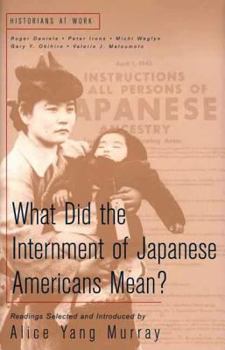What Does the Internment of Japanese Americans Mean?
No Synopsis Available.
Format:Hardcover
Language:English
ISBN:0312228163
ISBN13:9780312228163
Release Date:January 2000
Publisher:St. Martin's Press
Length:163 Pages
Weight:0.95 lbs.
Dimensions:0.6" x 6.2" x 9.6"
Customer Reviews
2 ratings
Finally Some People Write About The Unfairness To Japanese Americans In WW2
Published by Thriftbooks.com User , 15 years ago
Being half white and half Japanese was sometimes hard enough but when you would be in a history class during Jr. High school and High school and the teachers talked about the atrocities committed in world war 2 by the Japanese I would find it so hypocritical that they never truly discussed the atrocities of the interment camps during WW2 for Japanese citizens and other ethnic minorities of Asian lineage as well. Did the country of Japan commit atrocities yes but so did the United States,Germany,China,Russia,France,England,and many other countries if anyone bothers to look I Mean China executed millions of their own people who were forced to become drug addicts and prostitutes or who were drug sellers and yet to this day China still cries how Japan killed many of their people can you say Hypocrites. In war many atrocities are committed either in the name of sacrifices to win,the knowledge was needed to keep freedom for countries of the world you name it and most countries have done it for some inane cause to make themselves look better either to the world or to their own people. I also found it funny that while we villainies Hitler for killing 6 million jews and other minorities the nazi party found to be unfavorable Stalin killed almost 15 million of his own people by sending undesirables or political enemies to Siberia to die. So I say to people never take what people say in war at face value all countries will have their little hidden agendas and will use what ever means to make sure they come out victorious...
A Valuable Resource On The American Internment
Published by Thriftbooks.com User , 21 years ago
This Review refers to the paperback edition of "What Did the Internment of Japanese Americans Mean? (Historians at Work)", composed by Roger Daniels, Peter Irons, Michi Weglyn, Gary Y. Okihiro, and Valerie J. Matsumoto and as compiled by Alice Yang Murray.Murray's book is a compilation of several selections from prominent scholars and authors concerning the plight of those of Japanese descent caught in the Americas during World War II. A brief introduction providing insights into the lives of the authors and several questions accompany each selection. There is also a brief historical background of the internment preceding the selections. Murray provides an extensive list of other works witch may aid the reader in further studies of the topics represented following the selections. The book contains the following excerpts by the following authors; "The Decision for Mass Evacuation" - Roger Daniels, "Gordon Hirabayashi v. United States: A Jap's a Jap" - Peter Irons, "Hostages" - Michi Weglyn, "Tule Lake under Martial Law: A Study in Japanese Resistance" - Gary Y. Okihiro, and "Amache" - Valerie J. Matsumoto.Murray does an admirable job of portraying to the reader popular interpretations and general historical facts regarding the internment. The topics range from the constitutional laws broken by the internment, to the transfer of Latin Americans of Japanese descent to the United States so that the U.S. could barter them for Allied POWs. The book presents popular views of the Americans interned and their reactions to internment, giving the reader a well-rounded look at the current debate over the subject. Each selection is unique and proves invaluable in regards to understanding the internment and its implications on modern society.Each literary style is quite original therefore denoting that each style will need proper review. Murray writes in an average style, creating places where the sentence structure can be somewhat awkward. The author periodically goes back and forth between present and past tense, but does do a good job of conveying the topic at hand. The compositional style Daniels uses is quite assertive and conveys a more radical tone, he also seems to generally dislike lawyers - often bringing this dislike into his work, causing the reader general annoyance. However he provides proof to back up his statements and uses an otherwise gripping literary style that keeps the reader interested. Irons writes in a very professional tone, and presents the topics without extreme biases resulting in a well-written work. Weglyn presents a descriptive work, which at times appears to have a bit of anger behind it. Okihiro is slightly vindictive, often targeting other prominent authors and dismissing their work as incorrect. He presents a rather compelling work, but his single mindedness taints it. Matsumoto is very open minded, relating to the reader the wide spectrum of opinion instead of the lone mindset promoted by other authors. Howe





